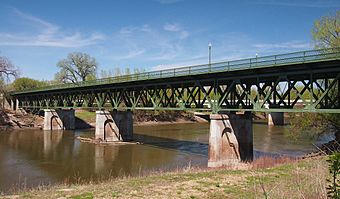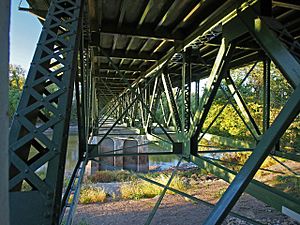Holmes Street Bridge facts for kids
Quick facts for kids |
|
|
Holmes Street Bridge
|
|

The Holmes Street Bridge viewed from the southwest
|
|
| Location | Holmes Street over the Minnesota River, Shakopee, Minnesota |
|---|---|
| Area | .68 acres (0.28 ha) |
| Built | 1927 |
| Built by | Minneapolis Steel & Machinery Company, Widell Construction |
| Architect | M.J. Hoffmann |
| Architectural style | Warren-with-verticals deck truss |
| MPS | Iron and Steel Bridges in Minnesota MPS |
| NRHP reference No. | 10000414 |
| Designated | July 6, 2010 |
The Holmes Street Bridge is a special old bridge in Shakopee, Minnesota. It crosses the Minnesota River. People also call it the Holmes Street Pedestrian Bridge or the Old Shakopee Bridge. This bridge is a type called a truss bridge, which means it uses a strong framework of triangles. It's one of the few "deck truss" bridges in Minnesota.
The bridge was built way back in 1927. For many years, important roads like US 169 and MN 101 used to go over it. It was the main way to cross the river in Shakopee. In 2005, cars stopped using the bridge. But don't worry! In 2011, it was fixed up. Now, it's a cool trail for people walking, cross-country skiing, and riding snowmobiles.
What the Bridge Looks Like
The Holmes Street Bridge is quite long, about 645 feet (197 meters). It is also about 42 feet (13 meters) wide. The bridge has four main parts that go over the river. It also has two smaller parts that connect to the land on each side.
The main structure of the bridge uses three parallel Warren trusses. A Warren truss is a special design that uses triangles to make the bridge strong. Usually, bridges like this only have two parallel trusses, so having three makes this bridge unique! You can also see fancy Neoclassical designs on the bridge's supports and railings.
History of the Bridge
The Holmes Street Bridge was built to carry Minnesota State Highway 5. This road was known as Holmes Street in Shakopee. Later, this route became part of US 169 and State Highway 101.
In 2009, a brand new bridge was built nearby. This new bridge now carries the main highways. This meant the old Holmes Street Bridge could be used for other things.
A Rare Design
In 1985, a study looked at bridges in Minnesota. It found that only 10 "deck truss" bridges were built before 1946. The Holmes Street Bridge is the only one of these old road bridges that is still standing today! This makes it very special.
A Historic Landmark
Because of its unique design and important history, the Holmes Street Bridge was added to the National Register of Historic Places in 2010. This list includes places that are important to the history of the United States. The bridge was recognized for its rare design and because it was built by an important company from Minnesota.
 | Aurelia Browder |
 | Nannie Helen Burroughs |
 | Michelle Alexander |




